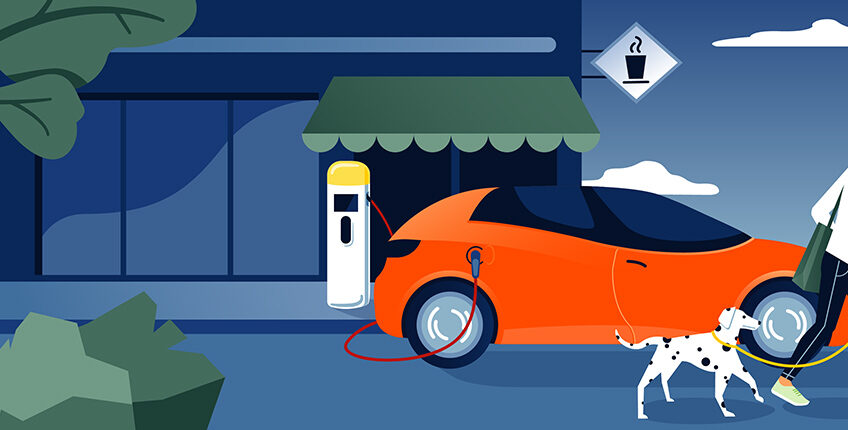Berlin, 30 March 2021 – Under a new funding programme of the Federal Ministry of Transport and Digital Infrastructure (BMVI), small and medium-sized enterprises (SMEs), small municipal utilities and local authorities as well as companies in the retail and hospitality sectors can submit funding applications to install charging infrastructure from 12 April, 2021 to 31 December, 2021.
The goal is to accelerate the installation of charging stations at attractive everyday destinations, such as supermarkets, hotels, restaurants, and municipal facilities, like swimming pools.
The funding amounts to 300 million euros and covers up to 80 per cent of investment costs. It is based on the new BMVI funding guideline: “Local Charging Infrastructure”. De minimus funding is issued on a first-come, first-served basis. The applications must be submitted to the Federal Office of Administration (Bundesanstalt für Verwaltungsdienstleistungen (BAV)).
The guideline expands BMVI funding mechanisms for a demand-oriented, nationwide and user-friendly charging infrastructure in Germany. The National Centre for Charging Infrastructure, which has been driving forward the rapid build-up of German charging infrastructure since the beginning of 2020 under the umbrella of federally-owned NOW GmbH, is supporting the shaping of the guideline.
Andreas Scheuer, Federal Minister of Transport and Digital Infrastructure: “We are building charging infrastructure where it will be used every day, i.e. where people actually are –supermarkets, hotels, restaurants, swimming pools or sports fields. Thus we are helping to provide a solution to all those who can recharge neither at home nor at work. With 300 million euros in funding, we are bringing more charging options specifically to locations where cars are already parked.”
Johannes Pallasch, Head of the National Centre for Charging Infrastructure: “Rapidly increasing numbers of e-vehicle registrations require urgent, accelerated installation of charging poles, as we want customers to be able to recharge simply, and anywhere. The new funding programme emphasizes the importance of local services and facilities as well as SMEs in the development of a comprehensive and user-friendly overall system. Municipal as well as small and medium-sized enterprises know local needs and are important for the acceptance of electric mobility on the ground.”
The funding is aimed at providing speedy assistance for SMEs. For example, small and medium-sized enterprises in the retail and hospitality sector that are particularly affected by the pandemic crisis have the opportunity to install a charging point inexpensively through the programme, thereby increasing acceptance on the part of their customers. Particularly in rural areas, these establishments have a significant number of parking spaces, which makes the construction of publicly accessible charging infrastructure especially attractive. Municipal companies, e.g. supply and disposal companies, can also benefit from the funding and make the topic of charging infrastructure construction more relevant.
The funding in detail:
- The funding is granted as de minimus aid.
- Only SMEs in line with the EU definition (also municipal companies) and local authorities are eligible for funding, provided the maximum overall funding amount does not exceed 200,000 euros over the current and last two calendar years.
- The following will be funded:
- The purchase of standard charging infrastructure (AC and DC) (3.7 kW to 22 kW) with up to 80% of the overall costs, max. of 4,000 euros per charging point,
- The purchase of fast-charging infrastructure (DC) of 22 kW to a maximum of 50 kW with up to 80% of the overall costs, max. of 16,000 euros per charging point,
- The connection to low voltage, including installation and construction costs in the amount of 80% of the overall costs, max. 10,000 euros funding per location.
- Funding combined with buffer storage is also possible (maximum funding amount is analogous to the associated grid connection).
- If accessibility is reduced (opening times: at least 12/6), the subsidy amount will be reduced to 50%.
- Subsidised charging points must facilitate contract-based charging, roaming and ad hoc charging.
- Electricity must be produced from renewable sources.
- The charging infrastructure must be installed by 31.12.2022.
The BAV is the granting authority as well as the contact for administrative and funding-related queries. Applications are to be submitted via www.bav.bund.de.
Federal Office of Administration (Bundesanstalt für Verwaltungsdienstleistungen (BAV))
Telephone: +49 41/6 02-5 55
www.bav.bund.de
The National Centre for Charging Infrastructure at the programme company NOW GmbH is available by email for technical queries:


